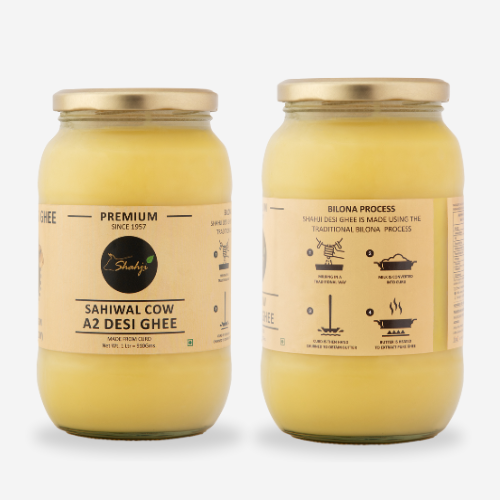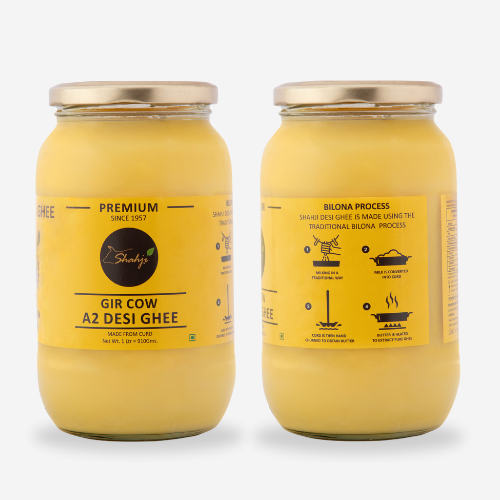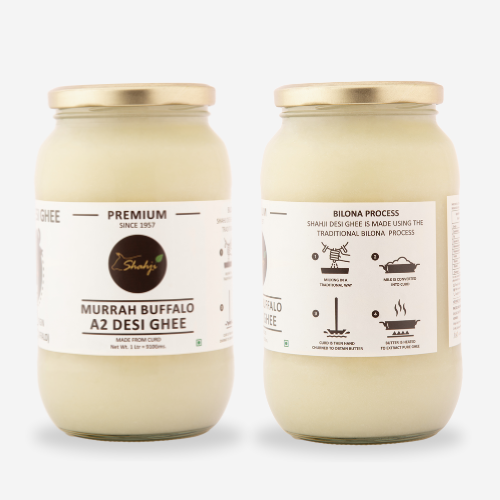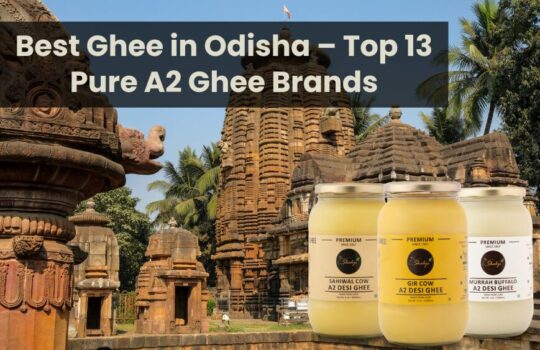Ghee vs Refined Oil: Best Pick for Daily
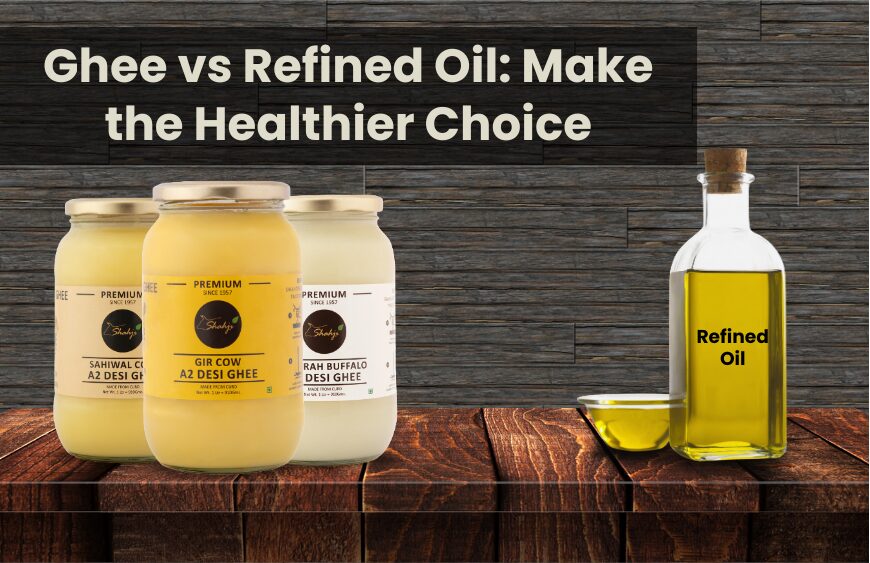
When it comes to daily cooking in Indian kitchens, the conversation around ghee vs refined oil gets hot. It is in the open for debate and quite a history behind it. Ghee is considered to have flavor and “Ayurvedic” benefits while refined oils improve convenience and neutrality of flavor. With today’s growing conscious health community, it is important to know: Which cooking fat has both taste and long-term well‑being potential? This article dives deep into both options, comparing their nutritional profiles, smoke points, traditional relevance, and health impacts to help you make an informed decision.
What is Ghee?
Ghee or clarified butter is made by gently heating butter to remove the water content and to separating the milk solids. The result is a beautiful golden aromatic fat that is lactose-free, casein-free and rich in fat-soluble vitamins A, D, E and K.
What is Refined Oil?
Refined oils are processed with high heat, extraction, bleaching and deodorizing. All of these increases the life of the oils, but ultimately removes the nutrients or antioxidants.
Nutritional Comparison: Ghee vs Refined Oil
Ghee Nutrition Highlight
- Butyrate: A short-chain fatty acid that protects the gut lining and aids in digestion.
- Conjugated Linoleic Acid (CLA): linked to fat loss and metabolism.
- Rich in fat-soluble vitamins: Fat soluble vitamins like vitamin A, D, E, K, helps in the better absorption of nutrients.
- Free from lactose and casein: good for people with dairy sensitivities.
Refined Oil Highlights
- Typically are rich in polyunsaturated (PUFA) and monounsaturated fats (MUFA), but most of the micronutrients get destroyed in the refining process.
- Reheating or reusing may form trans fat and other toxic byproducts.
- Often carry residual amounts of various chemicals such as hexane and bleaching agent, if the impurities were not completely removed.
Ghee contains natural and essential nutrients and bioactive compounds, while refined oils are stripped down and lack in functional health benefits.
Smoke Point & Cooking Stability
How Smoke Point Affects Cooking Safety
The smoke point is the temperature at which fats begin to break down into harmful compounds, such as acrolein and free radicals, and are key for both flavor and safety.
Ghee Smoke Point
Ghee can withstand temperatures ranging from 232–252 °C (450–485 °F), depending on the purity of the ghee. This makes it ideal for sautéing, deep frying, and roasting, while not creating any harmful byproduct.
Refined Oil Smoke Point
Refined oils smoke point range from 204–232 °C (400–450 °F) but, with repeated heating, they begin to break down as well. Over time, impurities and oxidation will gradually lower their smoke points which greatly increases the risks.
Ghee is a more chemically stable fat than oils at high heat – releasing fewer toxins, and retaining flavor and nutrition.
Health Benefits and Risks
Ghee: Nutritional & Wellness Advantages
- Digestive Enzyme: Butyrate promotes repair of the gut-lining and promotes a healthy microbiome.
- Better Vitamin Absorption: Fat-soluble vitamins in ghee can aid absorption of better nutrients from other foods.
- Immune System Support & Anti-Inflammation: Traditional Ayurveda and scientific research support immune system.
- Heart Benefits: Some studies indicate that using ghee in moderation may help increase HDL cholesterol compared to refined oils.
Refined Oil: Potential Risks
- A diet high in omega-6 PUFAs and trans fats may have effect on chronic inflammation and increase the risk for cardiovascular disease.
- Repeated heat can lead to chemical breakdown and toxin formation.
- Lack of nutrients – processing removes the beneficial antioxidants, and phenolic compounds.
Despite ghee being nutrient dense, it is still high in saturated fat – which in excess will add calories and impact your cholesterol levels!
Traditional Wisdom vs Modern Convenience
Ghee in Traditional Context:
Ghee is deeply entrenched in Indian culinary tradition and Ayurveda. It is considered “sattvic”—pure and nourishing. It is commonly used in temple offerings, festive treats, and daily cooking across regions of India.
The Rise of Refined Oils:
The modern industrial world raised the prominence of refined oils defined by cost-effectiveness, neutral taste, and availability. Unfortunately, the rise in refined oils came at the sacrifice of nutritional benefits and the appeal of natural flavors.
Ghee reconnects with tradition and digestive harmony, whereas refined oil emphasizes scalability and bland consistency.
Who Should Limit Ghee?
Although ghee is healthy in moderation but the individuals with following condition should be more cautious:
- High cholesterol or heart disease.
- Aiming for rapid fat loss.
- Following the low-fat diet protocols.
A typical healthy adult can safely consume 1–2 teaspoons (approx. 10–20 ml) per day. Always monitor overall saturated fat intake and consult a healthcare specialist as needed.
Is ghee better than refined oil?
Yes, ghee is considered better than refined oil for daily cooking, especially in Indian cuisine. Ghee is a natural fat rich in fat-soluble vitamins (A, D, E, K), butyrate, and antioxidants, making it beneficial for digestion, immunity, and heart health when consumed in moderation. It also has a high smoke point, which means it stays stable at high temperatures without breaking down into harmful compounds. Refined oils, on the other hand, are heavily processed, often contain chemical residues, and may contribute to inflammation when overheated or reused. For better taste, nutrition, and overall wellness, ghee is a smarter and healthier choice—especially when portion-controlled.
Conclusion
In the discussion of ghee vs refined oil for every day cooking, ghee is clearly the healthier, nutritionally dense, culturally authentic option. Ghee is naturally nutrient-rich, heat-stable and digestible resulting in it being an ingredient steeped in tradition within Indian cooking. Refined oils on the other hand, although aesthetically attractive, relatively cheap and time saving but lack in quality, taste, nutrients and may degrade into unhealthy compounds after repeated heating.
With proper serving size of 1 to 2 teaspoons a day of pure ghee can be a genuinely healthy cooking fat. Complement it with cold-pressed oils as needed, and always choose consciously for better taste, digestion, and long-term well-being.

